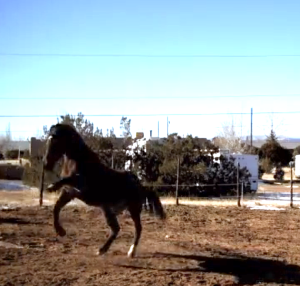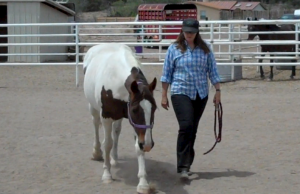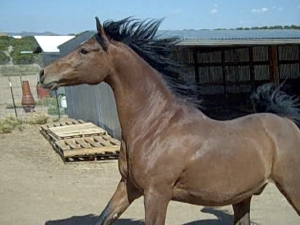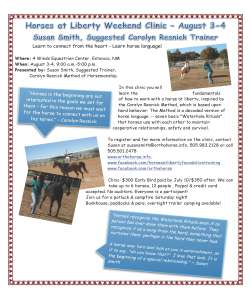Are you afraid of your horse? Being afraid of your horse is nothing to be ashamed about. Many horses are scary, or people have had scary things happen with horses. Sometimes people come to liberty training because they are afraid to ride, or have a horse that is unridable or unmanageable. It’s also good to have a healthy fear or caution when working around horses.
Anything can happen around horses. They are 1,000-plus pound animals who have a strong flight reflex. People can get hurt just walking their horse somewhere, or at feeding time. When you work around horses you up the ante of how many times you can get hurt because you’re there all the time. At the same time, when you work around them your senses become more keen, and you automatically have eyes in the back of your head. Still, with all that sensible caution, stuff happens. Horses don’t have to be “dangerous” to hurt you. Many have an uncanny lack of knowledge of their own physical boundaries and can just knock you over because they didn’t know or remember you were there. That’s why teaching them where their body begins and ends is important.
In all cases, we want to be able to move beyond our fear or if the situation is too scary, get out of it. To be in a fear state is not healthy for anyone over long periods of time. Just look at the survivors of battle – they come home with post-traumatic stress syndrome (PTSD), a very real thing. And PTSD can occur on other levels, because seemingly far less dramatic situations than war can cause it.
In a recent presentation at the Ortho-Bionomy Annual Conference held in Denver in May, advanced instructor of Ortho-Bionomy Ursula Hofer gave a talk in which she addressed trauma. She said the brain is not as in charge as we might think. She quoted the theory of Dr. Stephen Porges, director of the Brain-Body Center at the University of Illinois at Chicago, who wrote The Polyvagal Theory which identifies two distinct branches of the vagus nerve or tenth cranial nerve in mammals. The vagus nerve runs from the back of the cranium to the abdomen, the wiring for gut instincts and the mind-body connection. The “vagus” nerve has two distinct branches, the dorsal branch being responsible for primal survival strategies in vertebrates and control of the digestive tract. The ventral branch regulates “flight or fight” behaviors. These neural pathways regulate autonomic state and the expression of emotional and social behavior. In short, when the vagus nerve is out of sync with the rest of the body, it can manifest in many types of gastrointestinal disorders such as abdominal pain, chronic nausea and diarrhea, vomiting, bloating, and lack of appetite. This nerve communicates with the brain and vice versa, so it makes sense that when we go into a trauma mode, we may feel a reaction in our gut.
The reason we get afraid to the point of immobilization is very often because of trauma. Some animals will “freeze” under threat, this way conserving resources. People do that too, but often we get stuck in that mode, where as wild animals will generally move out of this mode once danger is past as their nervous systems recalibrate.
The bones may heal and on the exterior you can look and feel just fine. Trauma can make it hard for the nervous system to self-correct in people. Often it will keep you in a pattern of remembering the accident and it can also make you afraid without you ever being conscious of it. In relating this to horse accidents, I can be with a completely diffeeent horse, and the reflex to hunch up and curl into a ball is there. Others may see it but it is so much a part of me I can’t see it coming, I just find myself there. When I’m there, my horse responds to me, head up, high alert, what’s there to be afraid of? Why are you bracing? Where’s the mountain lion? I’d better go faster. For a fearful horse, this can make the situation even worse. And often times we can’t figure out by ourselves how to stop being fearful. It’s not an intellectual thing, it is alive in the body, as Porges points out.
Recently a friend of mine had a car accident. She said things kept happening after that, like she would run into a door, she couldn’t think quite right, she was slow to react and make necessary decisions; she just felt out of sorts all the way around. This is a typical trauma response. She wasn’t injured in the accident but it was so upsetting to her nervous system that it hadn’t been able to recalibrate and go on its merry way. This didn’t translate to horseback riding in this case, but it caused enough concern for her to come to me for help.
The body needs help in these cases to self-correct, because it’s not able to do it on its own. It has become stuck in a pattern.
Another consideration is that very often as a result of injuries incurred in an accident, the body isn’t as strong as it once was. In turn it lacks body confidence. The skeleton isn’t holding itself quite right and therefore, the organs are not weighted correctly or are compressed inside the structure. Some gentle exercises such as putting your feet up the wall, or yoga, can be helpful in helping the body right itself, if they feel okay to do. After an acute injury sitting in the saddle can be painful or awkward and it’s good to work with a professional who can help you restore the strength in your body and find the connection with your horse again. We may have to tailor our idea of what riding we can do for awhile until the body can heal itself enough, even not ride for awhile.
These approaches can all help dissipate the fear that has built up, and not allow it to trigger so much.
Our horses are mirrors of our fears and joys, so we cannot hide anything from them. Our relationships with them really require that we meet our fears and shortcomings, so that we can have an honest and present relationship with them. Every horse person has been in a position of being frightened by a situation or a horse, we have all been there.
There are also times when a horse may exude an energy you’re not comfortable with, either they are very high and excitable, or aggressive and you feel afraid. Trust that feeling and put the horse away or leave if it’s safe to do so. Afterwards you can pick the incident apart and try to figure out if it was something in you or the horse all by himself who got excited.
If this is a persistent problem, consider getting Ortho-Bionomy for yourself. The work can occur in the office, on horseback or on the ground, or just close to the horse. We work within your comfort zone. It can be combined with Liberty Training. The possibilities are limitless as is the potential for healing.
Bodywork (Ortho-Bionomy, Equine Positional Release/Equine Ortho-Bionomy): private sessions, tutorials, phone consultations, distance healing and gift certificates
Liberty Training: clinics, workshops, private sessions, tutorials, consultations: by appointment: 505.501.2478 or emailing susansmith@orthohorse.info
Now offering “Some Don’t Like It Hot” Liberty Training morning two-three hours-sessions over the summer for two-three people at a time, taking advantage of the cool hours. Tell a friend and get to experience liberty work together!
The upcoming Horses at Liberty Weekend Clinic will be held August 3-4 in Estancia, New Mexico. Cost is $300 Early Bird Discount if you sign up before July 10. After that date the cost will be $350. Contact me if interested! susansmith@orthohorse.info
Liberty Foundations Waterhole Rituals Equine Clinic at Spirit Horse Ranch near Oklahoma City, co-teaching: Ruella Yates and Susan Smith. Liberty Horse Training. September 28-29, 2013. Contact Ruella Yates at ruella@libertyfoundations.com, or 405-771-4274.




Thank you for this deep insight into fear, and suggestions of how to move beyond fear with horses!
Ruella Yates
Carolyn Resnick Certified Trainer
near Oklahoma City
Great article. I struggled with overwhelming fear after a fall from my horse. It has taken years to work through it. The fear is still there, but it does not disable me like it has in the past. I had never experienced a fear such as this and it was very troubling for me. Time, patience, the guidance of Ruella Yates, and the Carolyn Resnick Waterhole Ritual Method have helped me in my struggle to overcome this fear.
Very good article. I know so many who struggle with fear; I do too–mine I think is age related rather than specific trauma. The Waterhole Rituals, TTEAM, Connected Riding/Groundwork have helped me to find ways to be with my horses that resonate with my own internal being. This helps the fear. I value the WHR and these methods of training because it is a given in them that the human and the horse do not learn in FEAR. Riding through the fear simply does not work for most middle aged women and younger women..and men. :o)
I agree, Kate, about the age-related fear, even if one hasn’t been in a horse accident. I think that goes with losing body confidence as we age, because we know we are more fragile. I’ve not worked with TTeam or Connected Riding but do work with the Rituals and Centered Riding. Mostly, Ortho-Bionomy is what I use for trauma work, with the other teachings supporting that so beautifully. There are so many wonderful paths!
Very helpful article–thanks for posting this. Interesting to hear about the physiological basis of the fear response. I agree with Kate–how many times have we been told to just “ride through it!” For me, the last time was about three weeks ago, and it came from my riding instructor, who, though excellent, is 30 and still feels invincible. At 62, I know better. I’ve been working with Carolyn Resnick (online only, alas!) and the Waterhole Rituals for the past few months, and it’s making a huge difference in my relationship with my horse–and on my fear level.
I think riding through “it” is able to be accomplished after the trauma has left the body but not really before. I have muscled through fear before but it doesn’t get rid of the fear. Trauma work is very helpful to help with weeding out the unnecessary fear from the useful kind, and getting it to loosen its hold on your body. And the Waterhole Rituals are so valuable for relationship building, which helps you know what holes you have in your relationship with your horse.
At the age of 63, I know I am not as invincible as I thought I was years ago when I had a bad riding accident that took over two years of healing. The recent Waterholes Rituals course helped me stay calmer and lighter and keep my horse that way, too. We still have a ways to go, but this was a big step. Buying my “project” horse about 1.5 years ago brought up fears that I thought I had dealt with already. I was amazed at how strong those sensations were. I’ll look into Ortho-Bionomy. Cranio-sacral work has helped.
Buying a new young horse can bring up a lot of fears when we’re older. Good luck with your new horse and healing!
Good blog, Susan …
Interesting to put another light on ‘fear’. Here it comes.
I am 65 now – had a couple of accidents in the last 3 years – not due to my horse, though – it took me altogether 1 1/2 year of rehab – my body confidence was kind of shattered and I have been doing the WHR, in hand work and lungework ever since with my horse Marcello..
Then I met DZAR and asked them why I had this fear with Marcello – a fear I had never had before with any other horse – I suggested it had to do with my age and that because of my age I had become very cautious – after all when Marcello returned home when he was 3 after having spent the first 3 years of his life in a group of young stallions without the human interaction on a daily basis, he was the perfect example of a beautiful but very impressive animal..
Well to make a long story a bit shorter it was explained to me that it was my interpretation of my horse that caused my fear – my interpretation was his expression of freedom – in other words his expression of freedom caused me to fear him – meaning that I was/am afraid to be free myself – however I do wish to be free – so there lies the challenge – in the meantime I am experiencing an energy shift in my horse reflecting an energy shift taking place within me!!!!!
Thank you for sharing your experiences, Geerteke. I’m sure the use of the Waterhole Rituals is something Marcello enjoys as you do, and that you can play together without fear.
I found I needed to find the right people to ride around or to just ride alone. After a bad fall due to a run away spook because someone ran into the ring screaming in anger at their spouse; I ended up with serious injuries but continued to ride. We moved to boarding at a barn with very competitive riders, competitive in criticism. They knew nothing of our background and nothing of the accident. I would feel a panic attack coming and would get off hand walk awhile and then remount. They would call it my “pony rides. They started to give my horse a bad reputation although he was fine it was the rider, me, who had the issues. We moved on. I was never comfortable in hunt seat but my horse could not use a western by accident I found I was less fearful riding bareback and eventually would ride at liberty alone. I still would have panic attacks during stressful periods of my life but my horse would sense them and stop and wait them out. I found to acknowledge my fear was the most important thing and then accepting it and moving forward. I was fortunate to have a very good horse although large and intimidating very careful and aware of rider.
Very good advice. Your story also speaks to the importance of energy and how some people behave around horses as though they couldn’t hear or feel. Glad you were able to eventually ride your own ride.
This is a great article. Thank you for writing it.